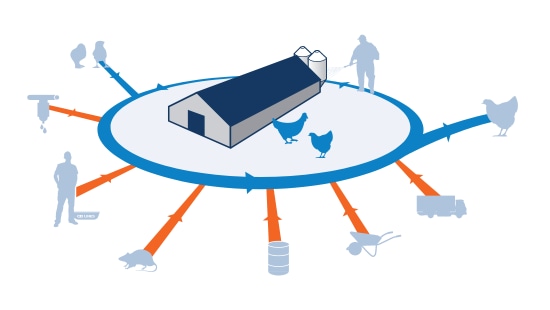
Transmission et prévention de la peste porcine africaine
La peste porcine africaine est une maladie virale très contagieuse, à propagation rapide et mortelle qui touche les porcs domestiques et les sangliers. Il n’existe pas de remède ni de vaccin.
La PPA menace la production et les moyens de subsistance des élevages porcins, et les éleveurs doivent adopter une approche proactive et utiliser des méthodes éprouvées pour protéger leur bétail.
Découvrez comment la peste porcine africaine se transmet et quelles mesures vous pouvez mettre en place pour empêcher que la PPA ne contamine votre exploitation.
Fièvre porcine africaine chez les porcs
Le virus de la PPA s’accroche aux vêtements, à l’équipement et aux véhicules, et il survit dans les aliments pour animaux, l’eau et la viande.
Les porcs sont infectés par la peste porcine africaine par :
- Contact direct avec un animal ou une carcasse infectés par la PPA
- La piqûre d'une tique molle (spécifique à l’Afrique)
- L'ingestion de déchets de cuisine, de résidus alimentaires ou de produits carnés provenant d’animaux infectés par la PPA
- Des matières contaminées provenant de chasseurs, de matériel agricole ou de véhicules de transport
- Transmission par des insectes piqueurs
Symptômes : forte fièvre, perte d’appétit, léthargie, saignements cutanés et diarrhée sanglante ; taux de mortalité aiguë

Informations sur les produits
Contactez votre représentant commercial local pour plus d’informations sur les meilleures solutions disponibles en fonction de vos besoins.
Comment prévenir la peste porcine africaine chez les porcs
Un programme de biosécurité comprenant des produits et des protocoles de nettoyage et de désinfection de qualité est essentiel pour protéger votre exploitation contre la PPA.
Les domaines clés de la biosécurité contre la peste porcine africaine sont l’hygiène à l’entrée, au transport et dans l’étable, l’hygiène de l’eau potable ainsi que le nettoyage et la désinfection des systèmes d’eau potable.
Conseils pour prévenir la peste porcine africaine
1. Ne nourrissez jamais vos animaux avec des ordures, des restes de nourriture ou des déchets ménagers.
2. Formez tous les employés, visiteurs et chauffeurs de camion à l’utilisation de produits et protocoles
d'hygiène adaptés ; Une bonne formation est essentielle pour créer de bonnes habitudes d'hygiène.
3. Placez des bains de bottes à l’extérieur de la grange, à chaque entrée, et assurez-vous qu'ils soient bien entretenus.
4. Assurez-vous que les véhicules de transport qui se rendent à votre ferme sont propres et désinfectés correctement.
5. Placez des bains de roue désinfectants et des arcs de pulvérisation à l’entrée de votre exploitation afin d’éviter l’introduction et la transmission du virus par les camions.
6. Nettoyez et désinfectez vos silos de stockage d’aliments et vos conduites d’eau potable après chaque cycle afin que le virus ne puisse pas se propager via l’alimentation et l’eau potable.
7. Prélevez des échantillons de votre source d’eau potable pour vous assurer qu’elle n’est pas contaminée.
Webinaire sur la peste porcine africaine

Lutter contre la PPA grâce à la biosécurité
La prévention des maladies est essentielle pour assurer la bonne santé et la résilience des animaux dans les élevages, et cela passe avant tout par la biosécurité.
La biosécurité externe empêche l'introduction de nouvelles maladies dans l'exploitation. La biosécurité interne contrôle les maladies existantes au sein de l'exploitation. Ecolab est spécialisée dans les deux domaines.
Un programme complet de biosécurité vous aidera à éviter les mauvais résultats, la mortalité des animaux, les coûts de traitement, les antibiotiques, l'emploi inefficace de la main-d'œuvre, les coûts alimentaires, les tests en laboratoire et une image négative sur les marchés.
En réduisant l'introduction et la transmission des maladies infectieuses, vous avez un impact sur votre production et sur votre chiffre d'affaires.


